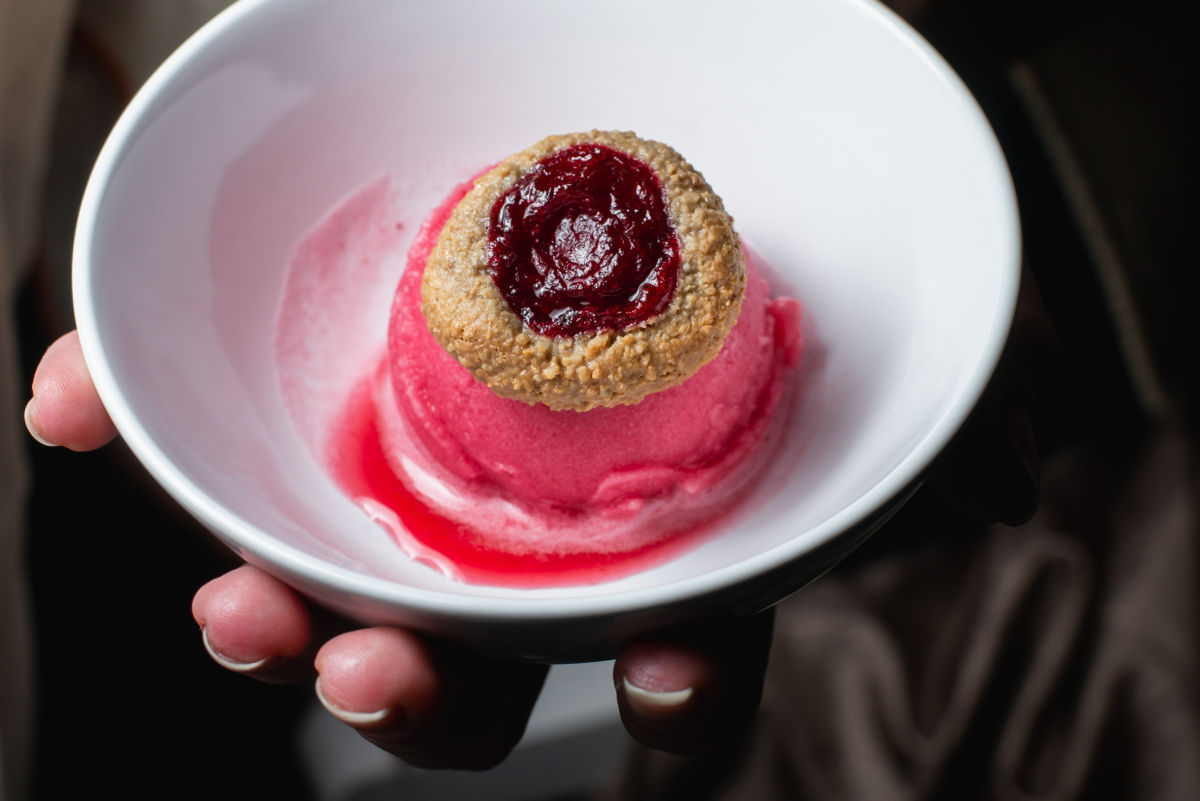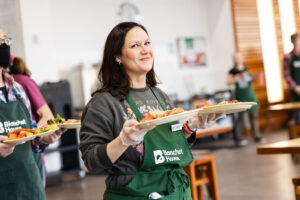Oraibi by Javelina Explores the World of Indigenous Cuisine

Elk skewers with huckleberry sauce and wild rice is one of the many dishes exploring First Foods at Oraibi by Javelina.
On a December evening within the SE Division pop-up space Kolectivo, dinner began with squash and mushrooms. Umber brown hen of the woods and yellowfoot winter chanterelles hid in a thicket of dandelion greens and chile sauce, bright pops of orange squash, and the crunch of toasted sunflower seeds sticking out among the forest floor. It tasted like the earth, mossy and sweet. Around the table, glasses held teas made with blueberry and wild rose or lemon balm and hawthorn berry, or coolers tart with huckleberry and mint. The room, normally austere and white with blank walls, now hung art of portraits of masked Hopi sun warriors, illustrations of maize, photos of Indigenous people upon horses. A shelf beneath them held a small library of mostly Indigenous writing: The New Native Cookbook, The Book of Hopi, the bilingual I Hope/Nipakosêyimon, written in English and Plains Cree.

Nick and Alexa Numkena-Anderson are the minds behind Oraibi by Javelina.
This is Oraibi, chef Alexa Numkena-Anderson’s Indigenous dinner series running through February at Kolectivo. An enrolled member of the Hopi tribe with familial ties to the Cree, Yakama, and Skokomish peoples, Numkena-Anderson started Oraibi as Portland’s only tasting menu that explores First Foods, those eaten by Indigenous people before the arrival of Europeans. For her squash and mushrooms—as well as every other dish on the menu—Numkena-Anderson relies on ingredients native to Turtle Island, the Indigenous name for North and Central America. With husband and business partner Nick Numkena-Anderson, she will run Oraibi over the winter while fundraising for a brick-and-mortar location, the first explicitly Indigenous restaurant in the city.

Braised rabbit and verde sauce on blue corn sope.
Portland diners may know the pair from their other pop-up, Javelina. They spent the past year developing a devoted following for their fry bread tacos and Sonoran hot dogs, categorizing their cuisine as “Powwow fare” and “Native American comfort food.” Fry bread served as the foundation for several dishes, buns for burgers and shells of ground beef tacos. Javelina conjured huge crowds at locations like Morchella, Grand Fir Brewing, and Street Disco; Numkena-Anderson even received an invitation to cook alongside Sean Sherman, a.k.a. “the Sioux Chef,” arguably the most famous Indigenous chef in the United States.

Chef Alexa Numkena-Anderson prepares an array of her squash boats.
Despite Javelina’s success, something felt off. She was conflicted serving postcolonial ingredients like dairy, refined sugars, and imported livestock, considering the United States’ long-documented history of distributing nontraditional, cheap, and low-nutrient foods to tribal communities. Fry bread, for example, was a dish born from the limited government rations sent to reservations around the United States, which included lard, flour, and salt. She was concerned about the high rates of diabetes among Indigenous communities in the US—over 17 percent for those who live on reservations, compared to the 11 percent nationwide. So, first at a January pop-up at Han Oak, she decided to try shifting away from fry bread tacos and jalapeño poppers, instead prioritizing precolonial ingredients and dishes. “I wasn’t feeling 100 percent good about the food I was putting back into the Native community,” she says. “I had always wanted to dive more into Indigenous foods or First Foods.”

The first night of Oraibi by Javelina.
Cooking without refined sugars or gluten was a challenge, but the response proved to Numkena-Anderson that there was a hunger for this kind of food. A little more than a year after the first Javelina dinner, she launched Oraibi by Javelina at Kolectivo, naming it after the Hopi village in what is now Arizona, likely the longest continually inhabited town in the United States. With one seating a night each weekend, the $100 tasting menu focuses on First Foods like elk, huckleberries, squash, bison, and Mayan red beans, served as a part of a tasting menu.
For most of the cooking, Numkena-Anderson isn’t drawing on specific recipes—often, there are no recipes from which to draw. “A lot of cultures have a goulash or a paella…a certain dish that represents their culture,” she says. “Native Americans don’t really have that just because they spent so much time just surviving and trying to get to the next day.” Instead, she draws from ingredients native to the Pacific Northwest and the Southwest, and often finds inspiration in her own history: her years working for restaurants like Imperial and Sammich, meals at longhouses and powwows, cooking with her Mexican grandmother. “When you’re creating something from nothing, you just have to follow your instincts and wing it and figure out what works and what doesn’t work,” she says.

The squash boat at Oraibi by Javelina.
At Oraibi, the Numkena-Andersons take turns describing each dish between courses, reflecting on the personal and cultural elements at play. Alexa’s Mexican heritage has long played a role in her cooking, but her approach to it at Oraibi leans on ingredients that predate the Spanish colonization of Mexico. Take, for example, the pop-up’s squash boat: A previous version of the dish at Javelina filled a delicata squash with chorizo and cotija cheese. At Oraibi, she fills it with Sonoran wheat berries and Mayan red beans, two grains and legumes that have been eaten for centuries, if not longer. Eschewing meats like pork and beef, she uses fauna found locally long before any of the first colonizer ships landed on Turtle Island soil: For instance, a blue corn sope arrives topped with braised rabbit, served with cacao butter and a mild verde sauce.

Elk and hominy stew enriches and soothes.
Other dishes hew closer to the Pacific Northwest where she grew up. She marinates elk in elderberry for a mild but enriching hominy soup, and bison skewers come with sunchokes and huckleberry sauce. Dessert is a cranberry sorbet, gently sweetened with maple and served with a sunflower seed cookie.

Cranberry sorbet and sunflower seed cookie at Oraibi.
Nick handles the drinks. While Javelina pop-ups tend to include cocktails, Oraibi centers nonalcoholic offerings like the Indigenous Tí and coffees. But there are a few local beers, as well as pinot noir from Greywing Cellars, one of the first Willamette Valley wineries with an Indigenous winemaker.
The pop-up is set to run through February, all while the couple fundraises on Honeycomb Credit for their own restaurant. Despite the chef’s commitment to the precolonial cuisine at Oraibi, the Numkena-Andersons plan on keeping Javelina operating as well, likely as the lunch service for the upcoming brick-and-mortar before it transitions into a prix fixe in the evening; they aren’t ready to completely abandon the fry bread, after all.
Share this content:















Post Comment